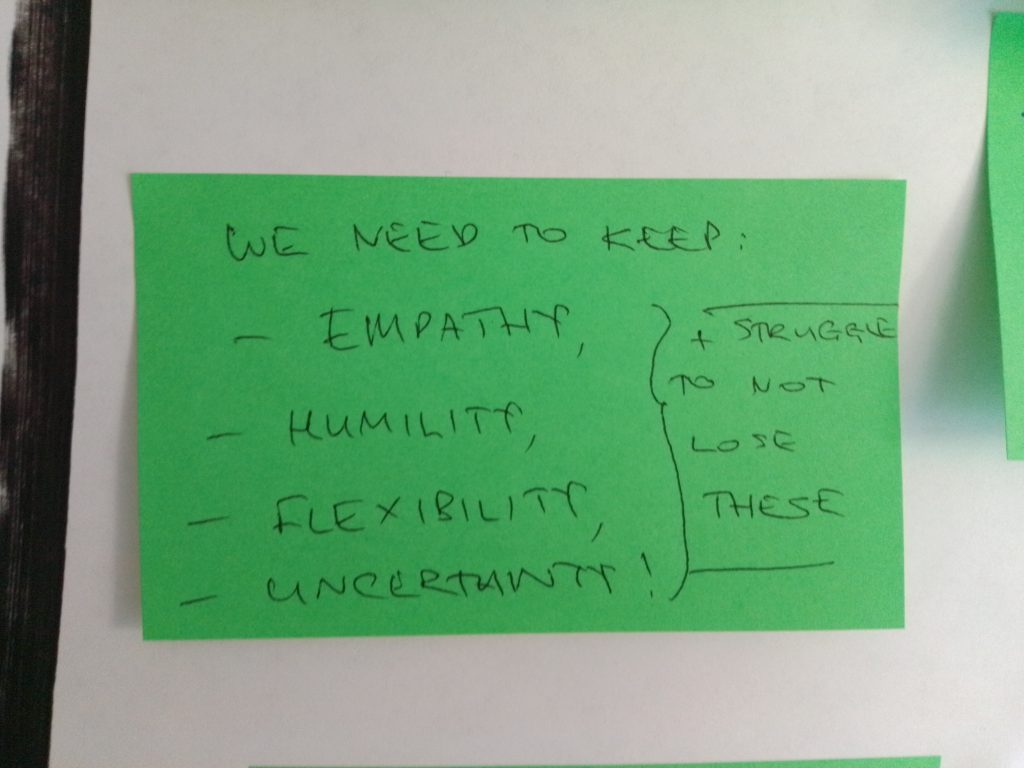The past two years have been a time of incredible change, including rapid shifts in the way we work as a philanthropic sector.
When Covid-19 hit in early 2020, we were all shell shocked, and foundations had to make decisions about how to react very quickly and with limited information. Emergency grants were made, new funds were set up, reporting requirements lifted, and project funding turned into core funding. Staff wellbeing and health came into focus, bringing with it a new notion of care. Two years on, the world is trying to adjust to ‘normal’, and the temptation to revert back to previous ways of working is strong. But what are the things that we don’t want to lose from the changes we made? What have we learned that could help us do our work better, and in greater service of those we seek to support?
We discussed this question with a small group of peers during Ariadne’s Great Reconnect, held in Lille, France, 26-28 April. The Great Reconnect was a paradigm shift from a traditional conference to an open space with room for reconnection, fun, and rest. In one small group, we talked about the ways that our sector had changed for the better during the Covid pandemic, despite hard times, and how we could sustain some of those changes. Here we offer a synthesis of some of the things we discussed and that we would like to keep in our own minds going forward.

Photo courtesy of Julie Broom, Ariadne.
Keep reporting requirements to a minimum. One of the most welcome changes that foundations made during the first months of the pandemic, from the perspective of their partners, was relaxing reporting requirements and focusing on the essential information they needed. Foundations accepted reports prepared for other foundations, extended deadlines, or replaced written reports with phone calls. These small adjustments helped many organizations get through a difficult time by easing administrative burdens. We support groups to do critical social change work, so let’s free them up to do it.
Prioritize the well-being of foundation staff and the staff of partner organizations. The pandemic with its shared vulnerability reminded us how interconnected we are, from a very local to a global level. It has been described as a crisis of care, laying bare the results of the neglect and devaluation of care work, but it also encouraged people to exercise different forms of care. Foundations gave their staff time off on a regular basis or paid a Covid bonus to make up for the burdens – slowing down, doing less. And we checked in with our grantees: how they were, what they needed, and how we could support them. We prioritized their well-being as well as their work.
Focus on the most vulnerable communities. The pandemic clearly demonstrated that our existing social and economic systems benefit some while completely failing to protect others. Just look at the difference between those who made record profits during this period and those that lost their livelihoods. This disparity continues to be evident in the current cost of living crisis. As we look ahead to the growing impacts of climate change, we know that poorer communities and those in the Global South will suffer more than others. We need to keep these communities at the centre of our analysis and our giving.
Be nimble and flexible. These past two years have taught us that you never know what’s around the next corner. Circumstances can change quickly, and organizations need to be able to respond to those changes. They will be better prepared to be nimble and adjust rapidly if their supporters are willing to give them the flexibility to do so. That might mean putting fewer restrictions on grants, giving longer-term support, or ensuring they have sufficient operational support. We have learned that we as foundations have a role in building infrastructure so groups and movements can be flexible, adaptive, and resilient. That includes flexible, multi-year core support.
Embrace uncertainty. The pandemic brought insecurity and uncertainty. In the Northern hemisphere, we are not used to the risks and uncertainties of everyday living. Yet foundations learned quickly to adapt and create new ways of working that we would not have thought possible. We moved from an extractive to a more collaborative working style, and that is better for us all. In an imperfect world, moving our resources in a caring and connected way is the best we can do.
Accept risk. Under Covid, we were constantly busy managing risk. How risky is it to go to the grocery store, to get on a train, to visit my parents? Taking well-calculated risks is at the heart of what foundations do. We have had a very limited understanding of risk, one that mirrors the understanding of risk in the investment world: how big is the risk of losing money? In grantmaking, the money is always sunk cost, but at least we want to see a return of investment in the form of impact. And then we were in a situation that did not allow for any milestones, deliveries, or outcomes. So, we learned to take new risks. Giving money without keeping control. Or giving money quickly without our usual due diligence process. Never mind that maybe, just maybe, a grant would go sour. What would that mean anyway in a moment of survival? Here we could learn from the investment world: five per cent failure is a good rate there!
Finally, a question that we sat within our lockdown homes was: What’s worth it? The answer we agreed on in our group was: Joy. Joy is worth it. If joy is essential to what we do, we are on the right track.
Julie Broome is the director of Ariadne. Claudia Bollwinkel is Senior Program Advisor at Dreilinden.




Comments (0)